外研版高中英语必修3 Module3同步练习
- 格式:doc
- 大小:65.50 KB
- 文档页数:6
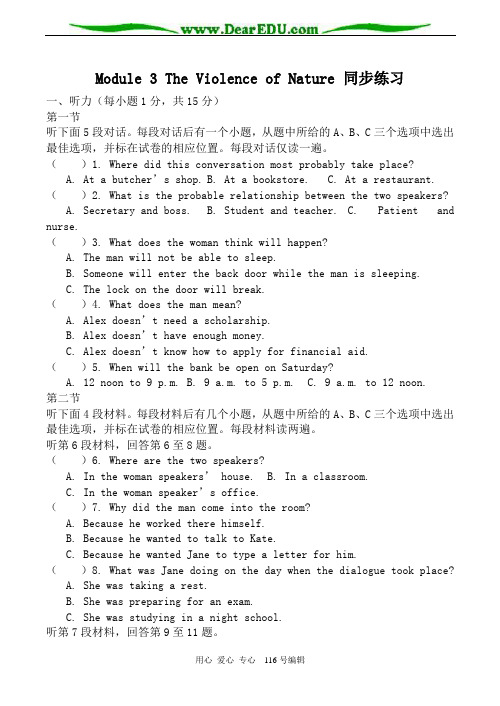
Module 3 The Violence of Nature 同步练习一、听力(每小题1分,共15分)第一节听下面5段对话。
每段对话后有一个小题,从题中所给的A、B、C三个选项中选出最佳选项,并标在试卷的相应位置。
每段对话仅读一遍。
()1. Where did this conversation most probably take place?A. At a butch er’s shop.B. At a bookstore.C. At a restaurant. ()2. What is the probable relationship between the two speakers?A. Secretary and boss.B. Student and teacher.C. Patient and nurse.()3. What does the woman think will happen?A. The man will not be able to sleep.B. Someone will enter the back door while the man is sleeping.C. The lock on the door will break.()4. What does the man mean?A. Alex doesn’t need a scholarship.B. Alex doesn’t have enough money.C. Alex doesn’t know how to apply for financial aid.()5. When will the bank be open on Saturday?A. 12 noon to 9 p.m.B. 9 a.m. to 5 p.m.C. 9 a.m. to 12 noon.第二节听下面4段材料。
每段材料后有几个小题,从题中所给的A、B、C三个选项中选出最佳选项,并标在试卷的相应位置。
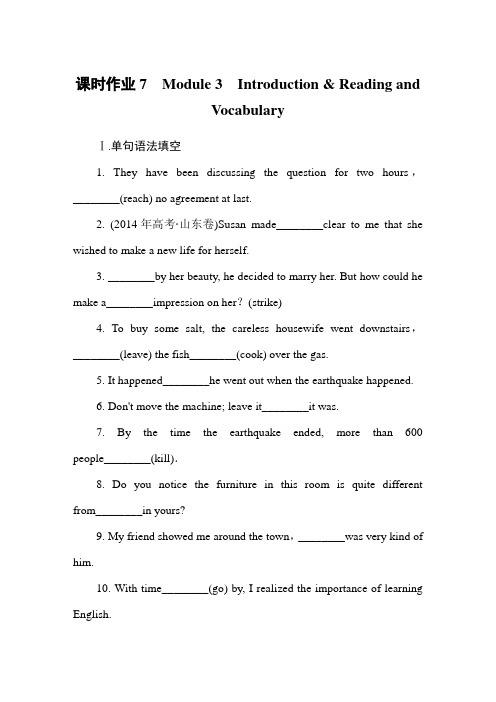
课时作业7Module 3Introduction & Reading andVocabularyⅠ.单句语法填空1. They have been discussing the question for two hours,________(reach) no agreement at last.2. (2014年高考·山东卷)Susan made________clear to me that she wished to make a new life for herself.3. ________by her beauty, he decided to marry her. But how could he make a________impression on her?(strike)4. To buy some salt, the careless housewife went downstairs,________(leave) the fish________(cook) over the gas.5. It happened________he went out when the earthquake happened.6. Don't move the machine; leave it________it was.7. By the time the earthquake ended, more than 600 people________(kill).8. Do you notice the furniture in this room is quite different from________in yours?9. My friend showed me around the town,________was very kind of him.10. With time________(go) by, I realized the importance of learning English.答案1. reaching'2. it'3. Struck; striking4. leaving; being cooked'5. that'6. where7. had been killed'8. that'9. which'10. goingⅡ.选词填空11.________,£15 worth of goods are stolen every day.12.It is very difficult for a nearsighted man to________a needle from the ground.13.You should________every word as carefully as you can.14.She________be out when we called.15.I've decided to________a few days ________ next week.16.Those people who have got money by cheating will certainly________in prison.17.In order to________the exact time when the person died, the doctor was in deep thought.18.He________his studies.19.________the storm, the castle was destroyed.答案11. On average'12. pick up'13. put down14. happened to'15. take; off'16. end up'17. find out'18. was buried in'19. As a result ofⅢ.完形填空My sister and I decided to help my brotherinlaw at his car shop. When we __20__ we saw that he was super busy. He __21__ us to work as both of his cashiers. “This isn't __22__,”we said.Once we got to the cash registers, there were three people in __23__ and we got right to work. My first __24__ was a tall man, and he had a little girl who was as __25__ as a little rabbit. The guy had many car supplies. I __26__ a lot of time with this person. “Thanks for __27__!” I said to him once I was finished.We were all so __28__,but we were all so busy that we couldn't even take our __29__ off all of the customers. I __30__ to call my mom to see if she could bring us some food, and then we told her my brotherinlaw was going to pay her back. __31__,she told us not to __32__,and that she would __33__ everything. “Thank you so much!”my brother-in-law told her. “No problem. It's the __34__ I can do and you always make my __35__ happy!” said my mom.Once my mom got there, we all went towards the __36__. My sister was eating as fast as a cheetah (猎豹), and I was eating as if I have __37__ eaten before.“__38__ helping,”my brotherinlaw said. Instead of payingus for the day's work, he rewarded us with an allyoucaneat dinner at an Italian __39__. When dinner was over, I went home.20. A. appeared B. arrivedC. startedD. woke21. A. begged B. orderedC. forcedD. asked22. A. easy B. normalC. fairD. necessary23. A. turn B. silenceC. lineD. power24. A. customer B. friendC. classmateD. guest25. A. long B. whiteC. cruelD. small26. A. wasted B. spentC. savedD. cost27. A. leaving B. goingC. comingD. stopping28. A. strong B. gratefulC. nervousD. hungry29. A. ears B. handsC. eyesD. shoulders30. A. decided B. agreedC. promisedD. regretted31. A. Meanwhile B. OtherwiseC. HoweverD. Therefore32. A. break B. worryC. sufferD. stay33. A. pay off B. pay backC. pay outD. pay for34. A. worst B. bestC. leastD. most35. A. brother B. daughterC. husbandD. son36. A. food B. giftC. waterD. money37. A. also B. everC. alreadyD. never38. A. Give up B. Thanks forC. Turn toD. Wait for39. A. restaurant B. kitchenC. marketD. town答案与解析姐夫开了一家汽车店。

Unit3TheworldofscienceSectionC Developingideas&Presentingideas&Reflection课后篇巩固提升必备知识基础练Ⅰ.单词拼写1.I (起草)the instructions myself last week.2.The (宣言) of Independence was made in America in 1776.3.The astronauts are conducting a series of (实验)to learn more about how the body adapts to weightlessness.4.The line between fact and (虚构) is becoming blurred.5.Cut the wire and (系) its free ends to a switch.6.As is well-known,to (传导) an electric current means to transmit electrons.7.It’s not a (科学的) way to test their opinions.8.Mars has an insubstantial atmosphere,consisting almost(完全地) of carbon dioists have been concerned with establishing (证明) for their arguments.10.There is a set (程序) for making formal complaints.Ⅱ.短语填空1. good service,the restaurant offers different kinds of traditional Fujian dishes.2.Hangzhou a beautiful city.3.When she walked into a room,the students were playing and talking, studying.4.The boxes were put on a train for Königsberg,which wasa German city.5.Whoever can the answer to the question in a few minutes is allowed to leave.6.The ball and knocked him out.7.Every winter some old people cold weather.8.I am firmly convinced of the significance of honesty,which will building a warm and harmonious society.Ⅲ.翻译句子1.这就是你们能想出来的最好的答案吗?(come up with)2.别忘了把标签系在你的行李上。
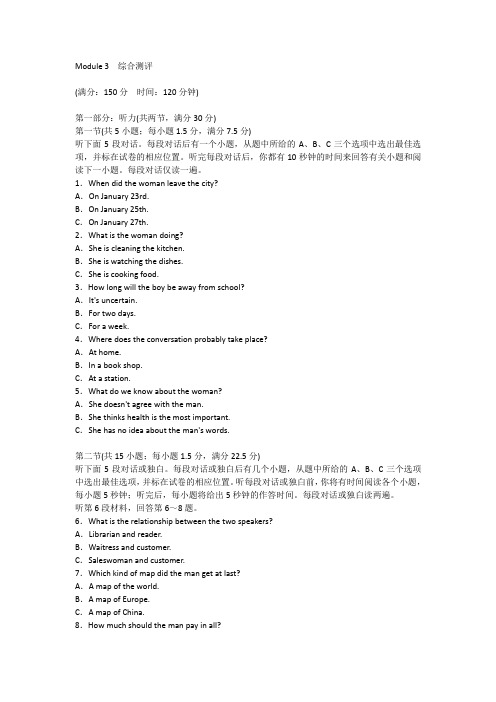
Module 3综合测评(满分:150分时间:120分钟)第一部分:听力(共两节,满分30分)第一节(共5小题;每小题1.5分,满分7.5分)听下面5段对话。
每段对话后有一个小题,从题中所给的A、B、C三个选项中选出最佳选项,并标在试卷的相应位置。
听完每段对话后,你都有10秒钟的时间来回答有关小题和阅读下一小题。
每段对话仅读一遍。
1.When did the woman leave the city?A.On January 23rd.B.On January 25th.C.On January 27th.2.What is the woman doing?A.She is cleaning the kitchen.B.She is watching the dishes.C.She is cooking food.3.How long will the boy be away from school?A.It's uncertain.B.For two days.C.For a week.4.Where does the conversation probably take place?A.At home.B.In a book shop.C.At a station.5.What do we know about the woman?A.She doesn't agree with the man.B.She thinks health is the most important.C.She has no idea about the man's words.第二节(共15小题;每小题1.5分,满分22.5分)听下面5段对话或独白。
每段对话或独白后有几个小题,从题中所给的A、B、C三个选项中选出最佳选项,并标在试卷的相应位置。
听每段对话或独白前,你将有时间阅读各个小题,每小题5秒钟;听完后,每小题将给出5秒钟的作答时间。
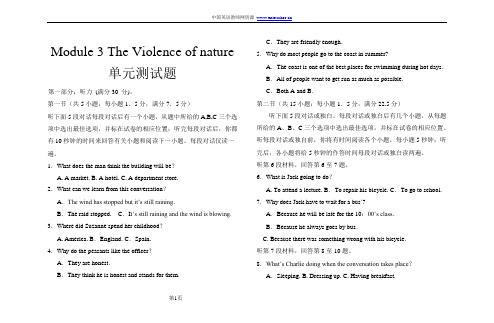
Module 3 The Violence of nature单元测试题第一部分:听力(满分30 分)。
第一节(共5小题;每小题1.5分,满分7.5分)听下面5段对话每段对话后有一个小题,从题中所给的A,B,C三个选项中选出最佳选项,并标在试卷的相应位置;听完每段对话后,你都有10秒钟的时间来回答有关小题和阅读下一小题。
每段对话仅读一遍。
1.What does the man think the building will be?A. A market.B. A hotel.C. A department store.2.What can we learn from this conversation?A.The wind has stopped but it’s still raining.B.The raid stopped. C.I t’s still raining and the wind is blowing. 3.Where did Suzanne spend her childhood?A. America. B.England. C.Spain.4.Why do the peasants like the officer?A.They are honest.B.They think he is honest and stands for them.C.They are friendly enough.5.Why do most people go to the coast in summer?A.The coast is one of the best places for swimming during hot days.B.All of people want to get sun as much as possible.C.Both A and B.第二节(共15小题;每小题1.5分,满分22.5分)听下面5段对话或独白。
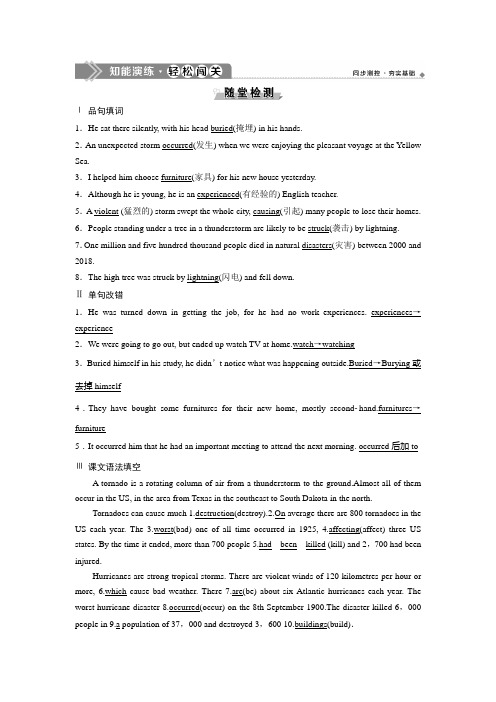
Ⅰ品句填词1.He sat there silently, with his head buried(掩埋) in his hands.2.An unexpected storm occurred(发生) when we were enjoying the pleasant voyage at the Yellow Sea.3.I helped him choose furniture(家具) for his new house yesterday.4.Although he is young, he is an experienced(有经验的) English teacher.5.A violent (猛烈的) storm swept the whole city, causing(引起) many people to lose their homes. 6.People standing under a tree in a thunderstorm are likely to be struck(袭击) by lightning. 7.One million and five hundred thousand people died in natural disasters(灾害) between 2000 and 2018.8.The high tree was struck by lightning(闪电) and fell down.Ⅱ单句改错1.He was turned down in getting the job, for he had no work experiences. experiences→experience2.We were going to go out, but ended up watch TV at home.watch→watching3.Buried himself in his study, he didn’t notice what was happening outside.Buried→Burying或去掉himself4.They have bought some furnitures for their new home, mostly secondhand.furnitures→furniture5.It occurred him that he had an important meeting to attend the next morning. occurred后加to Ⅲ课文语法填空A tornado is a rotating column of air from a thunderstorm to the ground.Almost all of them occur in the US, in the area from Texas in the southeast to South Dakota in the north.Tornadoes can cause much 1.destruction(destroy).2.On average there are 800 tornadoes in the US each year. The 3.worst(bad) one of all time occurred in 1925, 4.affecting(affect) three US states. By the time it ended, more than 700 people 5.had__been__killed (kill) and 2,700 had been injured.Hurricanes are strong tropical storms. There are violent winds of 120 kilometres per hour or more, 6.which cause bad weather. There 7.are(be) about six Atlantic hurricanes each year. The worst hurricane disaster 8.occurred(occur) on the 8th September 1900.The disaster killed 6,000 people in 9.a population of 37,000 and destroyed 3,600 10.buildings(build).Ⅰ单句语法填空1.He is an officer with ambition, who has many unusual experiences(experience).2.The flight takes off at midnight in Shanghai and lands about one and a half hours later in Tianjin.3.On average, men smoke more cigarettes than women.4.If he continues like this, he will end up lifting(lift) a rock only to drop it on his own feet. 5.(2019·天津耀华中学高一月考)In many countries more and more forests and even agricultural land are being lost to development, causing(cause) much of the land to become desert.6.A good idea occurred(occur) to him when he was asked to solve the problem.7.One day at daycare I watched an extremely tired mother attempt to pick up her daughter. 8.Qi Baishi’s style of painting often leaves the audience guessing(guess) and makes them use their imagination.9.The first time he met the girl he was__struck(strike) by her wisdom and fell in love with her. 10.Buried(bury) in his study, he didn’t notice that his parents had left.Ⅱ阅读理解AAs sea levels climb, even Washington D. C. could see morefrequent and widespread flooding at high tide.Strong storms and high winds sometimes bring floods to coastalareas. But cities and towns along the US East Coast are flooding even incalm and sunny weather. Among them is Maryland’s capital Annapolis. Tourists there must sometimes walk through water flooding downtown streets surrounding the habor. Sometimes water covers roads in Atlantic City, N. J. Even the yards and basements of coastal homes near New York City sometimes flood.All are suffering from this trend—normal high tides surpass(超过) a rising sea level. Sea levels have climbed, on average, about 20 centimeters(8 inches) over the past 135 years. And a sharp increase in tide flooding is one of the more visible impacts affecting many coastal areas, notes William Sweet, an oceanographer.Sweet and his coworkers recently analyzed data from 45 tide gauges(计量表) along the US coasts. These tools record the changing heights of tides as they rise and fall. From these data, Sweet’s team calculated the number of“troublesome floods”in various coastal cities. These floods, Sweet explains, typically occur when water level is about 30 centimeters(1 foot) above the historic level of the highest tides. In June 2014, the team reported finding a growing rise in these flooding events.In Charleston, S.C, from 1957 to 1963, the city experienced troublesome floods an averageof 4.6 days per year. But from 2007 to 2013, the occurring rate of troublesome floods jumped five times. Annapolis city was even more serious. From 1957 to 1963, troublesome floods were roughly 3.8 days per year. From 2007 to 2013, the average was 10 times higher—39.3 days a year.“Over the next few decades, climate change probably drives sea levels even higher,”Sweet says.“So today’s flooding problems promise to become only more widespread and frequent.”【解题导语】本文向我们说明了随着海平面上升,洪水发生得更频繁、更广泛,并列举了洪水带来的灾难,科学家们对洪水问题的研究,同时说明了气候变化对洪水的影响。
考点分布备考指南1.重点单词如experience, bury, occur等的识记、理解、固定搭配。
词汇和短语的理解和记忆不是孤立的,需要结合具体的句子和语境进行准确理解,掌握其基本用法和固定搭配。
同时要对所学单词和短语进行多方面的应用,及时复习巩固。
2.词性转化、固定搭配在语法填空、短文改错中的考查。
3.重点短语如pick up, end up等的理解及应用。
disaster n [,di'zɑ:stə] 灾难flood n [flʌd] 洪水hurricane n ['hʌrikən] 飓风lightning n ['laitniŋ] 闪电thunderstorm n ['θʌndəstɔ:m] 雷暴tornado n [tɔ:'neidəu] 龙卷风column n ['kɔləm] 柱状物;柱状体experience vt [ik'spiəriəns] 经历cause vt [kɔ:z] 引起;导致current n ['kʌrənt] 海流;潮流latitude n ['lætitju:d] 纬度furniture n ['fə:nitʃə] 家具bury vt ['beri] 埋葬feather n ['feðə] 羽毛fur n [fə] (动物的)毛皮occur vi [ə'kə:] 发生tropical adj ['trɔpikəl] 热带的equator n [i'kweitə] 赤道rotating adj旋转的;循环的violent adj ['vaiələnt] 猛烈的;激烈的;强烈的wave n [weiv] 波浪strike vt& n [straik] (struck; striken)(雷电、暴风雨等)袭击cemetery n ['semitəri] 墓地;公墓coffin n ['kɔfin] 棺材ruin vt[‘ruin]毁坏ash n [æʃ] 灰erupt vt [i'rʌpt] (火山的)爆发;喷发lava n ['lɑ:və ] 熔岩;岩浆tidal adj ['taidəl] 受潮水影响的;有涨落的专题解读知识清单单词和短语必修三M3M3单词表volcano n [vɔl'keinəu] 火山previous adj ['pri:vjəs] 以前的eruption n [i'rʌpʃən](火山的)爆发;喷发possibility n [,pɔsə'biləti] 可能;可能性earthquake n ['ə:θkweik] 地震terrifying adj ['tərifaiiŋ]吓人的;可怕的luckily adv ['lʌkili] 幸运地;幸亏thankfully adv ['θæŋkfulli] 感激地;满怀感谢地hopefully adv ['həupfuli] 满怀希望地;有希望地sadly adv ['sædli] 伤心地;不幸地fortunately adv ['fɔitʃənitli] 幸运地;幸亏warning n ['wɔ:niŋ] 警告worldwide adj ['wə:ld,waid] 全世界的active adj ['æktiv] 积极的;活跃的damage n& v ['dæmidʒ] 损失;损害M3短语pick up 卷起;掀起take off 去掉on average 平均起来end up 以……结束set fire to 放火(焚烧)……catch fire 着火put out 扑灭(火)take place 发生in all 总共;总计项目单词及其词性变化(语法填空必备)重点单词1.disaster n. 灾难2.cause vt. 引起;造成3.bury vt. 埋葬4.occur vi. 发生5.strike vt.& n. (雷电、暴风雨等)袭击6.ruin vt. 毁坏7.active adj. 积极的;活跃的8.damage n.& v. 损失;损害9.experience vt.经历→experienced adj.有经验的10.furniture n.家具→furnish vt.装备;配备11.violent adj.猛烈的;激烈的;强烈的→ violence n.暴力12.possibility n.可能;可能性→possible adj.可能的→impossible adj.不可能的13.terrifying adj.吓人的;可怕的→terrified adj.感到害怕的→terrify vt.使害怕14.luckily adv.幸运地;幸亏→lucky adj.幸运的→luck n.运气15.thankfully adv.感激地;满怀感谢地→thankful adj.感激的16.warning n.警告→warn v.警告重点短语1.pick_up卷起;掀起;拾起;接(某人);偶然学会;情况转好2.take_off 去掉;脱掉;起飞3.on_average 平均起来4.end_up 结果为……;以……结束5.set_fire_to 放火(焚烧)……6.catch_fire 着火7.put_out 扑灭(火);生产;制造8.take_place 发生,进行9.plenty_of 许多;大量10.in_all 总共;总计单元知识预览重点单词短语精讲1.experience vt.经历;体验n.经历;经验[教材原句]Do you know anyone who has experienced one of the events?你认识曾经经历过其中一种事件的人吗?experience in/of在……方面的经验by/from experience 通过经验,从经验中experienced adj. 有经验的;熟练的be experienced in 在……方面有经验[例句研读]①From/In my experience, there are three main reasons why people don't cook more often: ability, money, and time.根据我的经验看,人们不经常做饭主要有三个原因:能力、金钱和时间。
Module 3 The Violence of Nature同步练习单词拼写:根据句意按要求在空格处填上正确的单词,注意词形变化。
(1) F_____ act as a protective covering for birds, protecting them from cold, rain, sun and injury.(2) Lots of changes have o______ in our town in the past five years.(3) The Big Fire was one of the worst d______ that had ever hit London.(4) The old lady had a v_____ pain in her stomach as a result of eating bad eggs.(5) Haven’t you realized the d_____ those chemicals are doing to our environment?(6) In summer, there is a great amount of rainfall in the ______ (热带的) areas.(7) I’m sorry to say that I am unable to attend your party tomorrow because of a ______(先前的) appointment.(8) The farmer has ______(体验,经历) what hardships mean.(9) The storm_____(毁坏) the crops and the farmers’ hopes.(10) Political and economic crisis are ______(冲击) the capitalist system everywhere.从四个选项中选出最佳答案填入空格中。
必修三Module 3 单元测试第一节完形填空(共15小题;每小题2分,满分30分)阅读下面短文,掌握其大意,然后从1-15各题所给的A、B、C和D项中,选出最佳选项。
A group of Russian criminals have stolen more than 1.2 billion Internet usernames and passwords. They belong to more than 500 million 1 addresses. According to a New York Times report, it’s the largest known collection of its kind, because there is not so much 2 information that has been stolen before.Hold Security, the firm that 3 the theft, found that the group of criminals 4 personal information from 420,000 websites, including household names and small Internet sites. The criminals were based 5 in a small city in south central Russia. They 6 websites inside Russia and big companies in the US and even other 7 around the world. Now the company cannot 8 exactly which websites were broken into.According to Hold Security, the criminals have been using the 9 information to send junk mails through email and on social networks like Twitter. They could use the 500 million stolen email addresses to plan other 10 activities. They could also use information from bank emails to steal your identity or sell the email addresses to other criminals to make quick 11 .The reported break-ins are the latest events to 12 doubts about security at big and small companies. Last winter, criminals stole 40 million credit card numbers and 70 million addresses, phone numbers and other personal information from Target Corp. The company is still working to regain its shoppers' 13 .John Prisco is a CEO of a security firm. He says security attacksare more 14 than many people and companies realize. "This issue reminds me of an iceberg 90 percent of which is 15 underwater," Prisco says in an interview.1. A. prison B. email C. bank D. criminal2. A. home B. firm C. personal D. official3. A. suffered B. preventedC. organizedD. discovered4.A. needed B. showedC. collectedD. accepted5. A. greatly B. mainlyC. frequentlyD. luckily6. A. attacked B. protectedC. createdD. visited7. A. companies B. countriesC. websitesD. states8. A. say B. understand. C. prove D. guess9. A. latest B. quickestC. stolenD. known .10. A. physical B. culturalC. politicalD. illegal11. A. work B. action C. rush D. cash12. A. satisfy B. fight C. raise D.express13. A. trust B. respectC. praiseD. patience14. A. difficult B. commonC. seriousD. annoying15.A.unfortunately B. uncertainlyC. eventuallyD. actually第二节语法填空(共1 0小题;每小题1.5分,满分l 5分)阅读下面短文,按照句子结构的语法性和上下文连贯的要求,在空格处填入一个适当的词或使用括号中词语的正确形式填空。
Module 3 The Violence of Nature 同步练习第一节单项选择(共15小题;每小题1分,满分15分)1. _____, they were not injured in that accident.A. FortunateB. FortunatelyC. UnfortunatelyD. Fortune2. Flood, volcanic eruption and earthquake are terrible natural ______.A. disastersB. activitiesC. thingsD. features3. There are several problems ______ the volcano over the previous hundred years.A. withB. toC. atD. in4. When the volcano ______, the farmers were working at the foot of the mountain.A. was eruptedB. was broken outC. has broken outD. erupted5. By the end of last term, we ______ five English books.A. have learntB. had learntC. learntD. learn6. She told us that she ______ on May 10, 1966.A. had been bornB. was bornC. is bornD. were born7. _____, in the African countries, there are only from one-tenth to one-sixth as many doctors as there are in the United States.A. On averageB. By the averageC. At the averageD. By average8. China Daily is ______ a newspaper; it helps us to improve our English.A. less thanB. more thanC. rather thanD. no more than9. Police said that the accident ______ at about 5:30, when it was the rush hour.A. startedB. survivedC. occurredD. approached10. I met Bob at Jane’s birthday party and before that we ______ each other.A. had never seenB. did not seeC. have never seenD. never saw11. Many houses and cars were badly ______ when the thunderstorm suddenly struck that city.A. hurtB. injuredC. damagedD. wounded12. — What has ______ his illness?— The cold and wet weather, I think.A. reducedB. causedC. producedD. mixed13. The stranger said something in a ______ voice and the little girl was very much ______.A. terrifying; terrifiedB. terrified; terrifiedC. terrifying; terrifyingD. terrified; terrifying14. She is so badly hurt in the head, I’m afraid for such an old lady, there is no ______ that she will make a full recovery.A. possibilityB. questionC. advantageD. opinion15. Heavy snow lasted for three days and the little village was almost ______ under it.A. blownB. destroyedC. buriedD. contained第二节完形填空(共15小题;每小题2分,满分30分)I sat in my room on a summer day doing my holiday homework, I felt that the 16 was very hot and uncomfortable. The sun shone brightly and the birds kept staying in the trees which made no movement at all, 17 there was no wind. Suddenly a dark cloud hid the sun. Grey clouds gathered fast in the sky. The sky became 18 . The gathering clouds became thicker and blacker as they spread. I knew that a 19 would soon come.There came a breeze, then a gust of wind (一阵狂风). The 40 became stronger and stronger.It pushed the windows, 21 the fallen leaves, bent down the trees. Distant rumbling thunder (隆隆的雷声) was heard and came nearer and nearer. A large drop of 22 fell, and then another, and then the rain fell in the leaves of the trees and the 23 with a noise like the beatingof drums. A shining stripe (条纹) of light 24 the sky. Flashes of lightning 25 the yards and houses. Soon there came a terrible thunder overhead, and then the sky was full of roarsof thunder. The rain poured down.The 26 of the rain quickly increased. The darkness and the storm 27 . Thunder burst with a terrible crash. Rain poured down like sheets of water. Strong wind broke the 28 . It blew and rained.After a while, the rain stopped, and the thunder and lightning came to an end. The sky became 29 again, and the birds once more sang sweetly, while the trees and the flowers 30 almost as happy as before.16. A. weather B. time C. sky D. temperature17. A. but B. when C. for D. if18. A. bright B. clear C. black D. heavy19. A. rain B. storm C. disaster D. damage20. A. wind B. sky C. power D. speed21. A. blew down B. turned up C. pushed away D. burned down22. A. leaf B. water C. dust D. earth23. A. roofs B. walls C. doors D. windows24. A. covered B. filled C. moved D. mixed25. A. rolled over B. turned down C. lit up D. set aside26. A. amount B. violence C. condition D. behavior27. A. increased B. died down C. reduced D. went up28. A. ground B. roads C. air D. trees29. A. gray B. green C. black D. blue30. A. seemed B. smelled C. felt D. tasted第三节阅读理解(共20小题;每小题2分,满分40分)A31. is from Canada.A. Bill GatesB. Mark TwainC. Thomas EdisonD. Celine Dion32. The was born in 1835.A. inventorB. singerC. doctorD. writer33. My Heart Will Go On is the name of a .A. bookB. songC. storyD. film34. Dr Bethune worked in China for about years.A. 2B. 4C. 6D.835. Which of the following is true?A.Mark Twain wrote Business at the Speed of Thought.B.Bill Gates started working for Microsoft Company in 1955.C.Thomas Edison made over 1000 inventions.D.Celine Dion stopped singing in 1997.BAlf Bridgman was a footballer. He was born in 1948. He lived in Australia all his life and played football for thirty-two years. He lived near the sea. He liked dogs. He had three children, a boy and two girls. His favorite color was blue. He liked blue-and-white clothes. He never went out of Australia.Sue Morley was a singer. She was born in 1945 in the USA. She always loved singing. She had one child, a girl. Her daughter is a singer, too. Her favorite color was yellow and her favorite fruit was bananas. She had about four bananas every day for most of her life. She loved dogs, and usually had two.Peter White, the writer, was born in 1956. In his life he wrote 18 books. He lived most of his life in a village in England. He had one child, a boy. He liked cats and his favorite drink was tea. He enjoyed walking on the hills and by the sea. He never played games, and didn’t havea TV.36. Who was the youngest of the three persons?A. Alf Bridgman.B. Sue Morley.C. Peter White.D. Not clear.37. Who didn’t have a boy?A. Alf Bridgman.B. Sue Morley.C. Peter White.D. Sue Morley and Peter White.38. Who liked pets?A. Alf Bridgman.B. Sue Morley.C. Both Alf Bridgman and Sue Morley.D. All of them.39. What does the singer’s child do?A. He is a footballer.B. She is a singer.C. HE is a singer.D. She is a writer.40. Which of the following is NOT true according to passage?A. Alf Bridgman had never been abroad.B. Sue Morley was a great banana-lover.C. Peter White spent most of time in the city.D. All of them could speak English.CBooks which give instructions on how to do things are very popular in the United States today. Thousands of these “how to” books are printed; in fact, there are about four thousand books with titles that begin with the words “how to”. One book may tell you how to get money, another may tell you how to put it away or spend it; and another may explain how to give your money way.Many “how to” books give you advice on jobs. They tell you how to choose a job and how to succeed in (在……方面成功) it. If you fail (失败), however, you can buy a book called “how to make money”. If you never make any money at all, you may need a book whose name is “how to live on nothing.”Why many of these books become so popular? Probably because life has become so complex (复杂). Today people have far more free time to use, more choices to make, and more problems to solve. “How to” books help people live a better life.41. “How to” books_________.A. are very difficult to getB. have come out in great numberC. can be found in few countriesD. cost a lot of money42. If you can’t do your job well, you can buy_________.A. How to Turn Failure (失败) into Success (成功)B. How to Make a MillionC. How to Live on NothingD. How to Get a Job43. “How to” books are so popular because___________.A. life is very hard for most peopleB. such books are very cheapC. people have enough money to buy themD. people need to deal with (处理) complex life44. Many “how to” books tell you___________.A. how to live a better lifeB. how to live on nothingC. how to give other people adviceD. how to make a million (发大财)45. “How to” books are_________ according to the passage.A. expensiveB. very cheapC. helpfulD. uselessDOnce a week a nurse visits Tom’s school and teaches the students how to help people who suddenly become ill or who have had an accident. Last week, the nurse talked to the students about stopping bleeding. This is part of what he said.“When we cut ourselves we usually bleed. This is because out bodies are full of blood vessels, which carry blood to and from the heart. It doesn’t matter if we lose a little blood from time to time. In fact, many people donate blood to hospitals. We can give at least a pint of blood without harming ourselves. We mustn’t lose too much blood, however, so we need to know how to stop bleeding when it occurs.”“If the injury is small and the amount of blood coming from it is also small, we can usually stop the blood from flowing by pressing on the cut with a clean, cold cloth that has a little antiseptic on it. It is most important to use antiseptic. If you do not, then any dirt or bacteria that get into the wound may cause an infection.”“If the injury is large and the amount of blood coming from it also large, then it is necessary to stop the blood flowing through the blood vessel. We do this by putting pressure on the vessel above the injury. We can either press on it with our fingers or, preferably, put on a tourniquet, which is a piece of cloth tied tightly around the arm, leg or finger.”46. What is the main idea of this passage?A. A nurse visited Tom’ s school to tell the students how to donate blood.B. The nurse helps people who suddenly become ill at school.C. A nurse visited Tom’s school and t o1d the students how to stop bleeding.D. The students at Tom’s school learned about their bodies.47. What is one of the things the nurse teaches the student?A. How to help people who have been ill for a long time.B. How to help people who suddenly become ill.C. How blood is taken to a hospital.D. Why it doesn’t hurt to donate blood.48. What do blood vessels do?A. Make us lose only a little blood.B. Stop us from harming ourselves.C. Stop us from bleeding too much.D. Carry blood to and from the heart.49. How can the bleeding from a small cut be stopped?A.By putting a bandage (绷带) on the cut.B.By pressing antiseptic into the wound.C.By pressing on the cut with a clean, cold, wet cloth.D.By putting pressure on the blood vessel above.50. How can the bleeding from a large cut be stopped?A.By pressing on the wound with a tourniquet.B.By wrapping the injury in a clean, cold cloth.C.By putting pressure on the blood vessel above the cut.D.By trying a cloth tightly around the injury.第四节词汇(共10小题;每小题1.5分,满分15分)根据英文注释、首字母提示或汉语提示写出相应的单词。